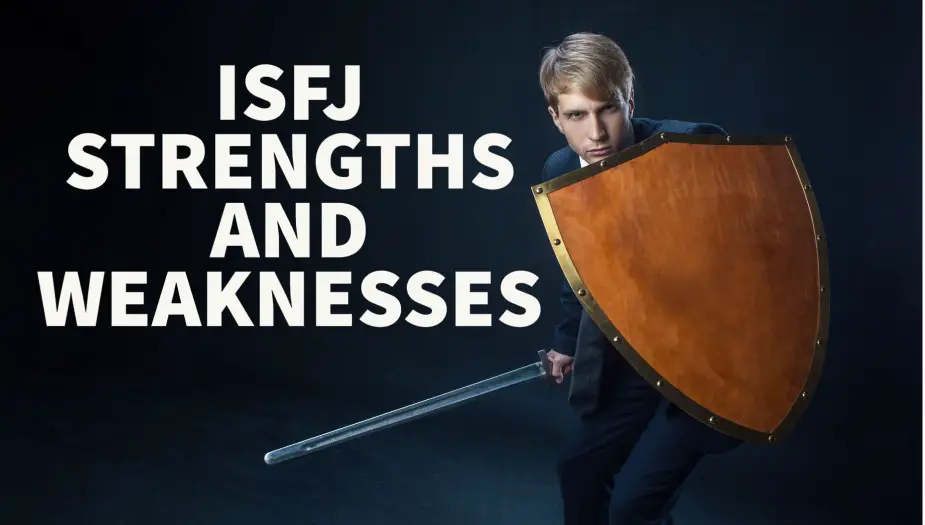Wondering what are the most common ISFJ Strengths and Weaknesses? Here are the top 5 ISFJ strengths and ISFJ weaknesses for the Protector personality type.

The ISFJ personality type is one of the sixteen Myers-Briggs® personality types. ISFJ individuals are often called “Protectors.”
They are loyal, helpful, and considerate of others. ISFJ strengths include their dependability, attention to detail, and sense of duty. However, they can also have weaknesses such as being too critical of themselves and others, taking on too much responsibility, and difficulty expressing their feelings.
In this blog post, we will discuss the strengths and weaknesses of the ISFJ personality in more detail.
What is an ISFJ personality type?
ISFJ stands for Introverted, Sensing, Feeling, and Judging. People with this personality type are often considered to be the “Protectors or Defenders.” ISFJs take great joy in taking care of others and making sure their needs are met.
They have an eye for detail and are good at managing tasks and projects. They have a strong sense of duty and are often the first to volunteer for any task that needs to be done.
List of ISFJ strengths
1. Loyal
2. Attention to Detail
3. Sense of Duty
4. Considerate
5. Empathetic
Top 5 ISFJ Strengths
Loyal
ISFJs are loyal to their family, friends, and organization. They are dependable and can be counted on to follow through with tasks. They put a lot of effort into making sure their commitments are fulfilled and will go out of their way to help those they care about. They take pride in their loyalty, and if betrayed, they may have difficulty trusting in the future.
Attention to Detail
ISFJs have an eye for detail and are good at managing tasks. They are organized and often will complete projects ahead of schedule. They pay attention to details and always have a plan for the future. They don’t like surprises or unexpected changes, so they may take longer to adjust to new ideas or challenges.
Sense of Duty
ISFJs have a strong sense of duty and are often the first to volunteer for any task that needs to be done. They strive to make sure everything is taken care of and will put their own needs aside in order to help their team or family. They may not always get the recognition they deserve, but they take pride in knowing that their hard work and dedication are valued by others.
Considerate
ISFJs are considerate of others’ feelings and needs. They often put the needs of others before their own. They are gentle and understanding, making sure that everyone’s needs are taken care of. They have a strong sense of morality and will not compromise their values even in the face of temptation or difficulty. They strive to maintain harmony and peace among their relationships.
Empathetic
ISFJs have a deep understanding of others and can easily relate to their emotions. They are compassionate and often provide support to those who need it. They respond to requests with understanding and patience, making sure that everyone’s needs are met. They can easily pick up on the moods of a group and adjust their demeanor accordingly. ISFJs strive to make sure everyone is comfortable and content, working hard to maintain a peaceful environment.
List of ISFJ weaknesses
1. Too Critical
2. Difficulty Expressing Feelings
3. Taking on Too Much Responsibility
4. Inflexible
5. Overly Cautious
What are the best ISFJ weaknesses?
Too Critical
ISFJs can be too critical of themselves and others. They can be hard on themselves when they don’t meet the high standards they set for themselves. They often put in a lot of effort to meet expectations and can become frustrated when their efforts don’t yield the desired results. ISFJs can also be too critical of others, expecting others to meet the same standards that they set for themselves.
Difficulty Expressing Feelings
ISFJs can have difficulty expressing their emotions. They may be hesitant to share personal details about themselves and their lives. Even when they do open up, they may be guarded in their expression of feelings. Additionally, ISFJs can have difficulty articulating their emotions and can come across as unapproachable or distant.
Taking on Too Much Responsibility
ISFJs can take on too much responsibility and become overwhelmed. They may feel like they need to take care of everyone around them and can forget to take care of themselves. ISFJs can become emotionally drained if they consistently put their own needs aside for the sake of others. They need to learn to set boundaries and recognize when they need to ask for help.
Inflexible
ISFJs may be inflexible when dealing with new situations or changes in plans. They can be set in their ways and may have difficulty adapting to change. ISFJs need to learn to be more open-minded and recognize that sometimes change is necessary for personal growth.
Overly Cautious
ISFJs can be overly cautious and risk-averse. They may be hesitant to try new things or take risks. This can limit their growth and prevent them from reaching their full potential. ISFJs need to learn to be more open-minded and recognize that sometimes taking risks is necessary in order to achieve success.
What makes an ISFJ personality unique?

An ISFJ personality is unique because of their strong sense of loyalty and empathy. They are incredibly devoted to those around them and will always put the needs of others before their own. They have a deep understanding and respect for people, which makes them great listeners and problem solvers.
ISFJs are also very reliable, going above and beyond to meet the needs of others. They strive to maintain harmony in their relationships and work hard to ensure a peaceful environment. They have a strong moral compass that guides their decisions and actions, making them trustworthy allies.
How can an ISFJ personality type overcome their weaknesses?
ISFJs need to learn to be more confident in themselves and their abilities. They should practice self-care and take time for themselves. ISFJs need to find ways to express their feelings in a healthy and constructive way.
Additionally, they should strive to be more open-minded and flexible when dealing with changes or new situations.
Finally, they should recognize when taking risks may be necessary and beneficial to their growth. With some effort, ISFJs can learn to overcome their weaknesses and reach their full potential.
ISFJ Careers
ISFJs make excellent career choices due to their strong desire to help others and their detail-oriented nature. Many ISFJs find success in roles such as healthcare, education, counseling, customer service, law enforcement, administrative support, or accounting.
In the healthcare field, ISFJs often excel in roles like registered nurse, occupational therapist, medical assistant, or physician’s assistant. They are often passionate about helping the sick and injured and providing comfort to those in pain.
ISFJs also do well in roles that require attention to detail such as accounting, bookkeeping, financial analysis or auditing. Their organizational skills and precision make them perfect candidates for these positions.
In the education field, ISFJs often find success as teachers or counselors. They are patient and compassionate individuals who want to make sure their students grow and succeed in life.
ISFJs can also do well in customer service roles such as receptionist, hospitality staff, or retail sales associate. Their naturally friendly and accommodating nature make them excellent customer service representatives.
Finally, ISFJs can also find success in law enforcement roles such as police officer or detective. They often have a strong sense of justice and may excel at the investigative aspects of this field.
ISFJ Strengths and Weaknesses Conclusion
The ISFJ personality type is known for their gentle nature and altruistic actions. They are reliable, supportive people who care deeply about others. However, they can also be guarded with their true feelings and may have a hard time asking for help when needed.
If you know an ISFJ, remember to appreciate them for their kindness and loyalty – but give them the space they need to recharge after socializing too much. Be sure to check out our other lists of strengths and weaknesses for different personality types here!
What is the 16 Myers-Briggs® personality test?
The 16 Myers-Briggs® personality test is a self-assessment tool that helps individuals to understand their psychological preferences and how they interact with the world. It was developed by Katharine Cook Briggs and her daughter, Isabel Briggs Myers based on the theories of psychologist Carl Jung.
The test looks at four key areas – extraversion/introversion, sensing/intuition, thinking/feeling and judging/perceiving – to determine an individual’s personality type. Individuals who take the test are given a four letter result that indicates their preferences in these areas.








Leave A Comment